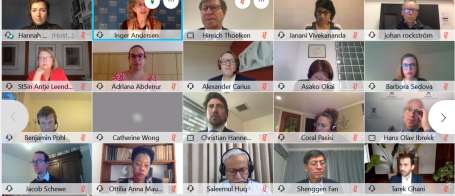A global call for a locally informed climate security risk assessment

In January 2021, adelphi and the Potsdam Institute for Climate Impact Research (PIK) brought together leading figures in development, environmental, foreign and security policy from around the world to discuss the key objectives and strategic priorities of Weathering Risk, in the first Strategic Advisory Board meeting. A summary of the meeting discussion follows.
State Secretary Antje Leendertse of the German Federal Foreign Office and PIK Director Prof. Dr. Johan Rockström opened the discussion, stressing the significance of better research on climate related risks to peace and security. Both emphasized the importance of science-based but people- and policy-oriented analysis, in order to develop methodologies and assessments that can be translated into concrete action points for governments and policy makers across different contexts around the world.
Most important to me is that the initiative is also aimed at identifying concrete entry points for political and preventive action such as improving early warning systems and our early response capabilities, as well as strengthening the resilience of vulnerable sectors and institutions.
State Secretary Antje Leendertse, German Federal Foreign Office
Inger Andersen, Executive Director of UNEP, underscored the significance of climate security to sustainable development, highlighting that when an environment can no longer sustain a society, it leads to societal implosion. She stressed the urgency of policy action on the ground, emphasising how taking an open-minded approach to risk assessments allows for valuable analyses of local and global dimensions that further undercut sustainability and climate security.
It is absolutely critical that the conversation is not Western dominated. …Weathering Risk includes the work of researchers from all around the world, including from nonnorthern countries and we need to ensure that those voices are heard.
Inger Andersen, Executive Director of UNEP
Asako Okai, Assistant Secretary General at UNDP, reflected on the power of cohesive and collective interaction for sustaining peace and maximising impact on the ground while maintaining a global perspective, and lauded Weathering Risk’s contribution to this end. She emphasised the value of looking closely at pilot regions to inform effective conflict mitigation policies.
Wolfgang Ischinger, Chairman of the Munich Security Conference, underlined the importance of public attention and pressure in driving policy makers to catalyse action. To this end, he invited Weathering Risk to present its findings at the forthcoming Munich Security Conference, to ensure that a broader international community of foreign policy and security decision makers are better able to act upon climate and security risks.
Ottilia Anna Maunganidze, Head of Special Projects in the Office of the Executive Director of the Institute for Security Studies, described the forthcoming challenges for Africa, especially African cities, in building resilience vis-à-vis climate-related displacement and migration. She reminded the board that it was imperative to consider potential blind-spots when conducting scientific analyses. She and Shenggen Fan, Former Director General of the International Food Policy Research Institute, highlighted the manifold causal linkages between food (in)security, conflict and societal stability – a priority theme for Weathering Risk.
The reality is that on the ground, the various climate-related security risks are inextricably linked and we need to ensure that our foresight and analysis reflect how complex and interconnected these issues are.
Ottilia Maunganidze, Institute for Security Studies
Tarek Ghani, Chief Economist at the International Crisis Group, addressed the over-militarisation of climate security risks and advocated in favour of balancing military awareness-raising with interdisciplinary approaches from the wider diplomatic, humanitarian and economic community. This was echoed by Adriana Abdenur, Executive Director of Plataforma CIPÓ, who highlighted that the security risks associated with climate change in Latin America are complex and manifold, ranging from gender-based violence to organised and environmental crime. She drew attention to the difficulty of national sovereignty and underlined the importance of more inclusive region-specific agendas when assessing the broader concept of climate-related human security. Coral Pasisi, Senior Advisor to the Director General of the Pacific Community (SPC) and Director of Sustainable Pacific Consultancy, echoed this by outlining the impact of climate change on food security, local communities, and the economy in the Pacific Islands.
It is critical that we have a fine-grained analysis and build resilience profiles into our approaches. Every community has a different ability to cope with different stresses, and it is imperative that local knowledge is built into the system.
Coral Pasisi, Senior Advisor to the Director General of the Pacific Community (SPC) and Director of Sustainable Pacific Consultancy
In his final remarks, Hans Olav Ibrekk, Policy Director in the Norwegian Ministry of Foreign Affairs, praised German leadership on the issue before outlining Norway’s objectives in mainstreaming and institutionalising climate security. He stressed the intersection between climate security and gender, and commended the inclusive and intersectional methodology adopted by the Weathering Risk research team.
It will be difficult to raise the profile of climate and security in the Security Council as there are strong actors working against us. The only way to broaden the agenda is to build on high quality analytical work.
Hans Olav Ibrekk, Policy Director in the Norwegian Ministry of Foreign Affairs
Closing the meeting, Michael Klor-Berchtold, Director General for Economic Affairs and Sustainable Development at the German Federal Foreign Office, highlighted the importance of specific and multilateral action under the umbrella of Weathering Risk. He reiterated that environmental implosion could lead to social implosion and called for an integrated and comprehensive risk assessment approach, taking into account food and water insecurity.
Share on

